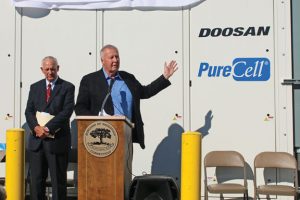
Local leaders have a lot on their plate and a lot to look forward to as they begin the new year.
In Naugatuck, Mayor N. Warren “Pete” Hess said there are three main areas he plans to focus on this year.
“I am going to start off every day of 2018 by focusing on the best manner in which to achieve success with the ‘Port of Naugatuck,’” Hess said.
The “Port of Naugatuck” would be an inland port and intermodal transportation hub on the mostly-vacant 86.5 acre parcel of land along Elm Street that is owned by Lanxess, the successor of Chemtura Corp. The port would allow international goods to go through customs in the borough.
“There are many moving parts but, to me, the project is a game-changer for the town and the best shot that we have to decrease our mill rate by bringing back our tax base,” Hess said.
Hess said he will also continue lobbying for better train service on the Waterbury branch line of the Metro-North Railroad — a vital piece of the borough’s plan for a transit-oriented development project at parcels A and B, the former General DataComm building and adjacent parking lot, downtown.
The state has money set aside for rail sidings, which allow two trains to pass each other, signalization, and positive train control for the Waterbury line. The only thing the state needs is money for five locomotives to pull additional trains, Hess said.
“I am going to focus my efforts at the beginning of 2018 on convincing our legislative delegation that the purchase of those five locomotives will help Naugatuck far more than any other areas of the budget they are looking at or concerned about,” Hess said.
Hess wants 2018 to be the year the state sets the advancement of the Waterbury branch line in motion.
“It seems clear to me that the state of Connecticut has to focus on transportation,” Hess said.
The third area Hess wants to focus on is expanding green energy throughout the borough.
In October, the borough unveiled new fuel cells to help power the wastewater treatment plant.
Hess wants to expand on that concept in 2018, building fuel cells that will power Naugatuck High School, the former armory building and Western Elementary School. The fuel cells, which would create a microgrid, could also be used to power essential businesses in the area, such as gas stations and grocery stores, Hess said.
“We can have a safe zone, so in the event of a hurricane or catastrophe, we will have a zone with heat, power, food and gas,” Hess said.
Hess is also looking at the possibility of installing solar panels at the Laurel Park Landfill, a superfund site off Hunters Mountain Road that has been capped for 20 years, and the creation of a merchant fuel cell project, which would allow the borough to sell energy generated by fuel cells.
In Prospect, Mayor Robert Chatfield wants to continue making improvements to the town’s community center.
Prospect purchased the former Community School on Center Street from Region 16 in July 2016 and turned it into a community center. Since then, the town has done some much needed work on the building, including repairing sections of the roof.
Chatfield said in 2018 the town will repair more of the roof, which will allow them to use more parts of the building.
The town will also upgrade and renovate the kitchen, Chatfield said, so civic organizations can use it for fundraising events.
Chatfield said the town is also looking at repairing more town roads in 2018. He didn’t have a specific plan for which roads and the amount of repairs, saying that it will depend on how much the town can borrow to do the work.
Chatfield added this year, as in all years past, he wants keep a tight-fisted control on the taxpayer’s money to ensure the town doesn’t over spend.
In Beacon Falls, the main focus will be economic development, First Selectman Christopher Bielik said.
“Economic development is always at the top of the list,” Bielik said.
In 2017, the town hired Connecticut Economic Resource Center, Inc. to help get the town’s economic development plans in order.
Bielik said the town will continue to work towards being in a strong position with economic development in 2018.
“We are looking to try and see what the new year brings along that front,” Bielik said.
The town is also hoping to take delivery of its new firetruck this year, Bielik said.
In 2016, the town approved bonding up to $850,000 for a new 75-foot quintuple combination pumper firetruck.
The new truck will replace Engine 1, a 27-year-old pumper truck that the fire officials have said is past its useful life. The new truck will have a pumper and a 75-foot aerial, which is a maneuverable, telescoping ladder.
In October, the town received three bids to build the truck. However, the committee overseeing the purchase of the new truck recommended that the town reject the bids since one was over $850,000 and two did not meet the specifications.
Despite the setback, Bielik said the town could very well see the new truck at Beacon Hose Company No. 1 by the end of 2018.
Bielik said one of the most difficult tasks the town will have to deal with this year is building the 2018-19 municipal budget.
Bielik said he is not certain how cuts to the state’s biennial budget, which was passed in 2017, will affect the town or Region 16, which oversees schools in Prospect and Beacon Falls.
“There are a lot of questions that will have to be looked at very seriously as we go through this process,” Bielik said.













